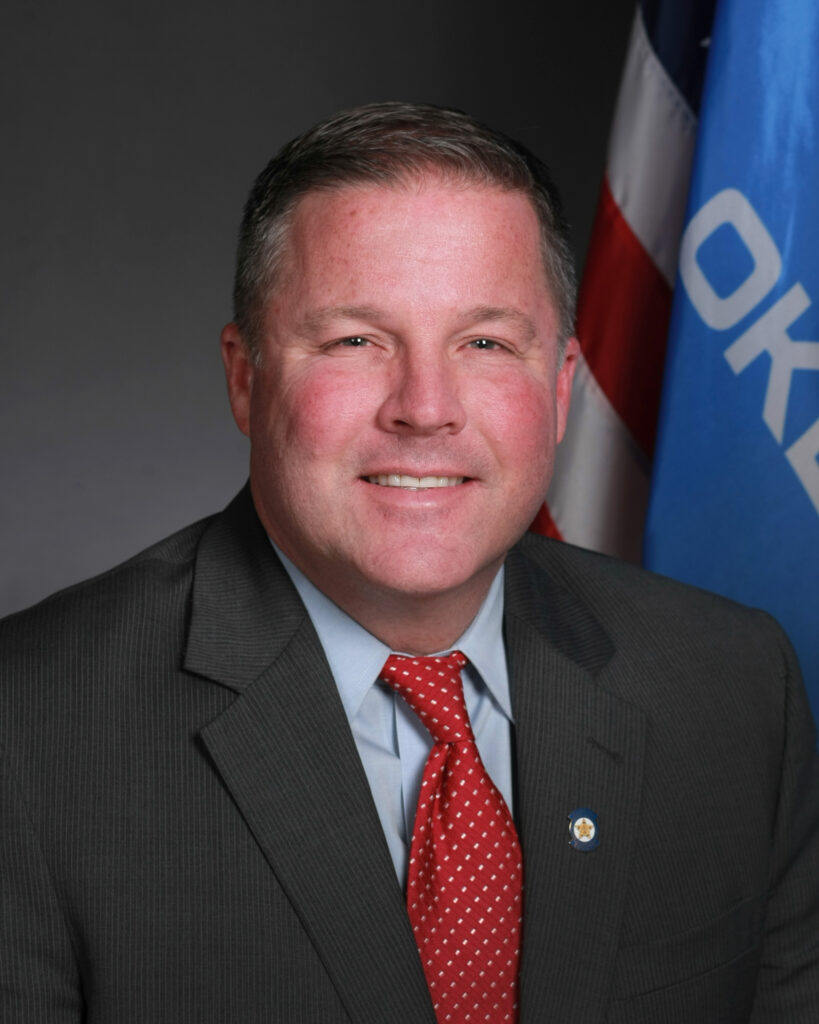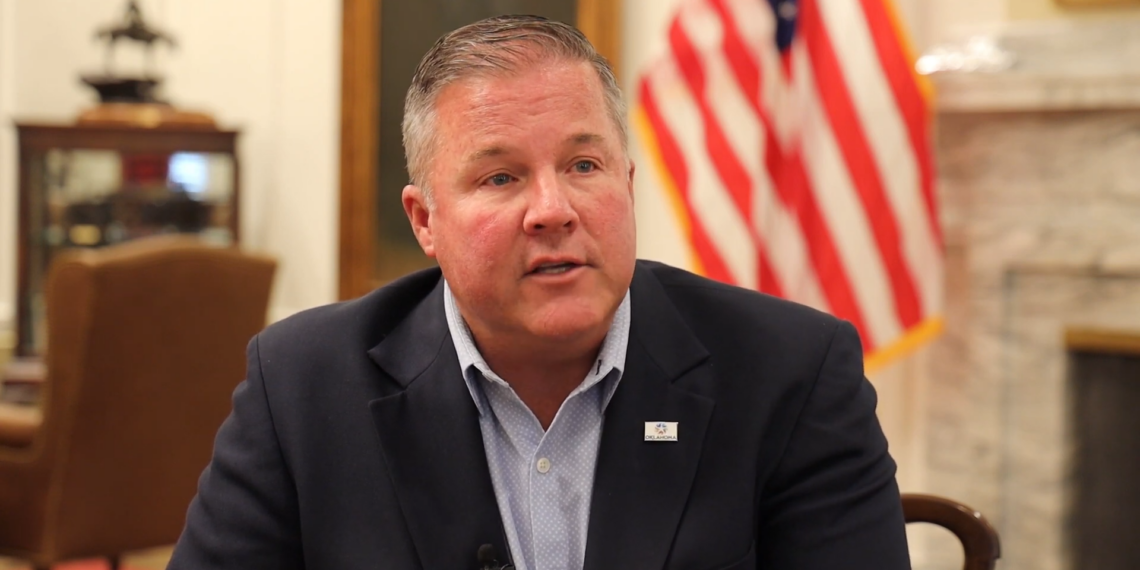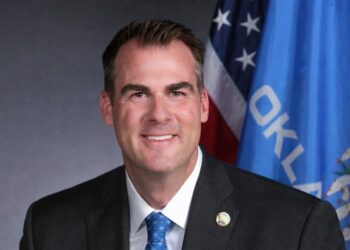OKLAHOMA CITY (OBV) – Sen. Lonnie Paxton is set to lead the Oklahoma State Senate as the Senate’s next president pro tempore. His top priority? Working with Gov. Kevin Stitt to reduce the personal income tax.

The pro tem-elect has a wide range of priorities for the 60th Oklahoma Legislature, including reducing the personal income tax, growing the workforce through career-readiness education, developing the economy through business recruitment, building infrastructure and making childcare more accessible and affordable for Oklahomans.
OBV’s full interview with Paxton is featured below:
What are your top priorities for your first year as pro tem?
Paxton: Well, the first priorities are just kind of learning the job. There’s a lot to this. As we go forward every day, I learn more things. So, it’s kind of learning the priorities of just running the office, and that’s kind of a big deal that I’m working on now. But we’re also trying to get all of our committee structures laid out, trying to get all the new chairs and vice chairs in the committees, and try and get those committees filled and making sure we put in the right people in the right places. That’s kind of our first thing out of the box.
Talking about policy, we’re going to be dealing with tax cuts this year, we’re going to be dealing with infrastructure, we’re going to be dealing with workforce development. Different things with childcare is going to come up again. So, there’s gonna be lots of things that we deal with, and a lot of what we do will be driven by the bills that our caucus members file.
Gov. Stitt and your predecessor, Pro Tem Treat, didn’t see eye to eye on some issues. There was often disagreements on tax plans, with Gov. Stitt wanting income tax cuts and Pro Tem Treat saying the state could not afford to cut those taxes at that time. What do you want to see done with tax reform? And do you want to eliminate the income tax, or would you prefer to reduce it to a certain percentage?
Paxton: I don’t think you could eliminate it at any one point. I think the reduction is what we’re looking at over time and to continue to reduce that. We’re one of 50 states, and states compete against one another. And you look at our regional states around Oklahoma, most of them are reducing their income tax. And that is one thing companies do look at [when deciding] do they want to stay in Oklahoma or do they want to go somewhere else. To recruit [companies] in, [we must ask] what are the surrounding states doing. So the income tax is a big deal.
I think what the Senate wants to do is to make sure that our reoccurring revenue into the state is stable. And I think we’re to the point that we can say it is stable. I think we’re past all the COVID money that came in and all the federal money that came in. I think we can look at our budget and say that the revenue we’re getting is a stable source of income. We kind of know where we’re at; so, I think we’re probably to the point now we can make a really good, informed decision about what to do with income tax cuts and how much that that tax cut needs to be.
There will be a discussion this year between the governor, between the House, between the Senate. All of our caucuses will be involved in that. It’s not just a Senate plan or a House plan or a governor plan. It’s all of us coming together to make sure that we do it in the right way, a responsible way, so that we can give taxpayers some of their money back, but also still have the core services of government taken care of.
What agenda items do you look forward to working closely on with Gov. Stitt and House Speaker-Elect Kyle Hilbert?
Paxton: It’s gonna be the tax cuts. That is a governor priority. He campaigned on it when he ran for reelection. He campaigned for it in the primaries this year. It is a priority of the governor’s. We know that it is, and it’s something that will probably be at the top of the list. What are we going to do, how are we going to do it, and how are we going to make it affordable?
One thing you have to remember is Speaker Hilbert and myself both came into the legislature in 2016. That was at the time of budget failures, revenue failures, teacher walkouts, all sorts of problems. And some of that happened because of tax cuts that were done previously that had some triggers built into it that probably should have been done a little bit different.
We’re just willing to move forward with this. We want to make sure we do it in a way that we don’t leave a future legislature with what we inherited during that 2017, 2018 time frame. It can be done. I think we’ve established that now with our budget that we have a good, stable revenue coming in. Also, our economy is more diverse than it was 10 years ago, 15, 20 years ago. And so, I think you have a lot more stability in our economy. But I think we’re all going to agree that tax cuts will be discussed very, very rapidly from once session gets started.
How high of a priority is workforce on your agenda, and why is it an important issue for Oklahoma?
Paxton: This is my ninth year in the legislature, and it has been on the list of about every business group that I’ve been around since I got here, that workforce development is an issue. It’s a problem that we don’t have the workforce in order to recruit businesses into the state and to build the businesses that we already have. So, it is a huge deal. And so, sometimes I get a little impatient with our education establishments, that we’re not entering that as quickly as I think that we should. And so that’s kind of been my charge to them. This is my ninth year [in the Senate], and I’m still hearing the same thing today that I heard nine years ago.
We’re trying to dig into it. I know there’s groups out there that are working very hard in the private sector to help foster this and relationships between the private sector and the state. So, I think there’s some good opportunities out there. I’ve heard about some things that are going on and kind of seen firsthand things that will be some opportunities in the future. I think you always have to remember that we’re competing with 49 other states for this workforce and for businesses.
I think it is a major priority. It’s one of the top priorities that we have.
What do you think are some key measures that the legislature can pass in 2025 to grow a more skilled workforce in Oklahoma?
Paxton: I think it’s kind of bringing the business community and the state together, probably more than they ever have. That’s already happening before I’ve taken on this position. There’s already been some movement in that area. I think [it involves] dealing with The State Chamber and some of the other chambers throughout the state. There’s already some collaboration going on between the state and those business organizations to kind of get a little bit better idea of what exactly does the K through 12 need to be doing? What does CareerTech need to be doing? What does higher education need to be doing specifically to build that workforce out? To recruit business into the state or build a current business that we already have here into being bigger than what they already are, they have to have people that are trained and skilled to work there.
So, it is a major priority. And I think we’re seeing some things happen that’s going to make that happen a lot better.
Touching upon education and its relation to workforce, the Graduation Act of 2024 was a key piece of legislation, last year, for growing the future workforce. Do you consider career readiness education essential to growing the workforce, and are there any other educational matters that you’d like to see the legislature take on this year to provide students the skills they need to gain a successful career after high school?
Paxton: It starts off in first grade, second or third grade with the kids learning how to read and write, learning the basics. I think there was a time we kind of got away from the basic part of doing that.
My wife was a schoolteacher for over 30 years and taught second grade. Just in the last couple of years, they kind of brought the whole phonics concept back. She said the kids reading course really, really started improving when they brought back some of the old style basics into teaching kids. You look at that and say, “When a kid comes out of high school, are they ready to go? Whether they’re gonna go straight into the workforce or seek education beyond high school, whether it’s CareerTech or the higher education system? You know, that when they get out of high school, they are ready to go into something.” And so, that’s kind of the thing that we’re going to see moving forward is that I think we’re going to keep pushing really hard on K through 12 to make sure those kids are ready.
And then when they get out of high school, some of them are going straight into the workforce. And we want to make sure there’s plenty of jobs out there for those kids that don’t seek higher education past high school, but also if they do, that CareerTech continues to do a really good job in preparing them. What I’ve been impressed with from CareerTech is how much and how quickly they adapt to industry.
I think you if look at the whole film incentive that we have in Oklahoma now and the film industry coming into the state, you [see that] career techs pretty quickly pivoted to where they can start teaching young people how to build sets for a movie. That’s something they did a really good job at. That just one example. I’ve seen that through the oil and gas industry and everywhere else. They seem to do a really good job with that. And higher education will continue to work with them to make sure that we have those workforce development [classes]. The end goal is to make sure that when these young people are through with their education, that they’re ready to go to work.
Are there any key industries in the state that you think has an especially high need for a skilled workforce?
Paxton: I think if you look back at the history of Oklahoma, we were always an energy and agriculture state, and that’s basically what we were for the first 80, 90, 100 years of our state’s existence. Some legislators, well before my time, started pushing really hard for the aerospace industry. And now that industry is the number two industry in the state. That is an area that needs a highly-skilled workforce in there, and there’s plenty of jobs and plenty of opportunity for growth. They’re doing a great job in expanding the state, and there’s a lot of public and private partnerships to make that happen. But that is where a skilled workforce happens.
The largest industry in the state is energy, and there’s plenty of spaces in there where you need that skilled workforce. So, I think at every level that we look at, you need skilled workforce. And skills can be all sorts of things. It can be hands-on skill or it can be knowing how to work at a computer. There’s plenty of opportunities out there.
But I think we’re not just an oil and gas and agriculture state anymore. We have lots more opportunities, lots more reasons for young people to stay here. We just need to make sure that we keep building on the successes that we’ve already had.
The Oklahoma Workforce Commission has been meeting for a year now and is on the cusp of hiring a CEO. What is the benefit of having a Workforce Commission? And how do you see the legislature working with the Commission to enhance the workforce?
Paxton: I think it’s fantastic. I think it’s a deal that we’ve needed for a long time, to be able to have that commission helping guide the legislature. Most of us are citizen legislators and we don’t come here as experts in too many fields, so, we get a lot of stuff put on our plate that we’re trying to work with.
Workforce development is not something I ever dealt with in my life prior to being in the legislature. So, having an outside group like that that’s going to have the CEO, that’s going to have the commission, that’s going to have the the experience to help guide us is crucial.
The legislature passed landmark legislation last year with the creation of OkEDGE, the purpose of which is to attract top companies and entrepreneurs to Oklahoma and to retain the businesses that are already here. What actions should Oklahoma take to do a better job at attracting businesses that are looking to expand?
Paxton: You hit on two things there. One, how do we attract new businesses into Oklahoma and how do we keep our existing businesses? Those are very similar to each other, but they’re also distinct. We look at some of the successes that we already had in Oklahoma and businesses that are wanting to expand. Do we have the infrastructure in place so they can do that? Do we have the facilities that the state should be responsible for? Are they ready to go so that they’re ready to expand?
We don’t want to ever forget the fact that we already have businesses here that are incredibly successful, that are nationwide and worldwide companies. What are we doing to make sure from the state that we have things in place for them? Whether it’s a better road system around their facilities, whether it’s making sure we have the law enforcement in place, emergency services in place – everything that the state needs to be doing to make sure that’s happening.
When it comes to recruiting, I think OkEDGE is a big deal. We have to make sure that we’re recruiting the right type of businesses for our state and that we’re vetting those that are coming in to make sure it’s what we want here in Oklahoma, so we can really focus on getting the right businesses in here.
When you say the right businesses, is there a particular kind of business that you have in mind?
Paxton: I think it’s businesses that fit well into what our fabric is. Oklahoma is a state that has lots of wide open spaces. I think our advantage over Texas is the fact that we’re not as congested as some of their major metropolitan areas are. You can get around here a lot easier than you can in other states. So, what kind of business fits into an area that needs a wide open space? I’ve heard we’re recruiting businesses in here that deal with drone technology. We have some great areas in Oklahoma that would fit that very well.
We have areas in Oklahoma that are wide open and are able to do things other states might not be able to. We’re very well placed right here in the center of the country where we have some great opportunities that are just natural resources for us.
Accessible and affordable child care is a major concern for many Oklahomans. Around 55 percent of the state is classified as a child care desert. Many parents, mothers especially, are having to leave their jobs to stay at home and take care of their kids because they don’t have accessible, affordable child care. How high of a priority is the child care crisis to the Senate? And what new measures should be taken by the legislator to make child care more affordable and accessible in Oklahoma?
Paxton: The child care issue is a work in progress. I know the Senate passed legislation last year. There was a House bill that came over to the Senate. I think it was amended, but I think it ended up not moving forward past the House and we sent it back. But it is a work in progress. It’s very complicated.
Where does the state need to play a role in child care? I think we definitely do. We’re still trying to work out what that role is. So it is a huge deal. I know a lot of [parents], especially younger couples, that have stayed home now because they can’t find affordable child care or what they would consider quality child care close by.
It is an issue that we’re working on. It’s just I don’t think we’ve found the solution yet, but we’ll continue working on it.
Do you think the tax credits for employers that help their employees with childcare is a good idea?
Paxton: I voted for that last year. That’s what last year’s child care bill had in it. It was a tax credit for those employers that share in the child care responsibilities for their employees. I think something is going to happen. We’re still trying to figure out what that right thing is.
You previously mentioned infrastructure. What are some infrastructure priorities for you?
Paxton: I grew up in rural Oklahoma, and I’ll just give you an example of it. When it comes to building roads, safe roads save lives, period. So the more roads that we can take care of, the better off it is. Sometimes people in the metro areas look at the big projects that are going on where you have interchanges that are massive, interchanges that are being modernized to handle the traffic flow and traffic count. But in rural Oklahoma – and this also goes back to the the economic belt, one of those areas – if we don’t have good roads getting to places, people aren’t going to put businesses out there. If we don’t have the broadband expansion, people aren’t looking at businesses out there.
But going back to the road issue, when you talk about a rural two-lane road, those can be extremely dangerous, and [there’s] lots of high fatality rates on those roads. When they do what’s called a super two-lane highway – which is wider lanes and also has eight foot shoulders on it – when those get built, the fatality rate goes way down. And also, the access on those roads – whether it be by the oil and gas industry, the agricultural industry – anybody driving on those roads has a much safer trip because of how those roads are being designed.
Just for example, where I live, just out west of Tuttle, about 15 years ago they had repaired a road and redesigned it, and it had been there since the beginning of the state. I’ve been a volunteer firefighter in my community for 33 years. The first 20 years of that career as a volunteer firefighter, we averaged a fatality in the three-mile stretch from my house to town every other year. Over a 20-year period, 10 people died in a small three-and-a-half mile stretch. Since that road was repaired 15 years ago, we’ve had zero fatalities because that’s how big of a difference that wider two-lane road [makes]. The traffic count has gone up a lot in those 15 years because of how active the oil and gas industry is in that area. But now you can drive down that road and it’s much, much safer.
So, we fix roads like that. Not only are we making the roads easier to drive up and down, not only are we making it better for economic development, we also make it safer. You think about every one of those people that got killed in that 10-year period. That’s a family that’s lost a husband or a son or a daughter or a loved one, and all the things that go along with that. That’s a cost that you can’t even calculate that are not happening now because we’re saving those lives, because the roads are safer. That needs to happen not just in the area close to Oklahoma City, close to Tulsa, but everywhere around the state.
We will continue to pump all the money that we can possibly afford into transportation to make sure we can get those roads taken care of all across the state.
Pro Tem Treat had a long run as pro tem. Has he given you any advice or insight on how to handle the job?
Paxton: Sure. We visit all the time. He’s not just the former pro tem, he is also a personal friend. I know I can pick up the phone anytime I want to – and I do that – and get advice. It’s not just Pro Tem Treat, it’s also previous pro tems before him, people that have dealt with this exact job.
I’m not the first one to do this. I don’t have to really reinvent anything. I need to lean on people who have the previous experience. And that’s kind of how I get through anything, is look at who’s done it before and ask them how they did it.

















